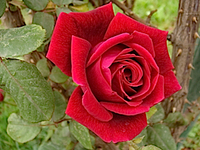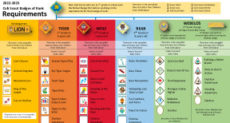 An essential part of youth leadership development is the reflection that follows a youth-led event or activity. It gives the boys a chance to talk about what went right and what could use improvement, and how to better plan for next time.
An essential part of youth leadership development is the reflection that follows a youth-led event or activity. It gives the boys a chance to talk about what went right and what could use improvement, and how to better plan for next time.
In our troop, as in many, we call it “Roses and Thorns.” It’s simple: at the next troop meeting, every boy who went has a turn to reflect on the experience. “Roses” – good things – are encouraged. “Thorns” – not-so-good things – are also OK, but the rule is that every thorn needs to be accompanied by a rose, to keep it from being overly negative. And no names.
Usual roses are “The food was good,” “the campsite was great”, “the game of capture the flag was fun”. Frequent thorns are “It rained” or “it was cold”, and sometimes “The Rattlesnake patrol beat us at euchre while it was raining.”
Adults like to get in on the act too. But is it appropriate for adults to place themselves among the boys, to listen to their feedback and offer some of their own? Adults may feel it’s a good way to take the pulse of the activity and offer some suggestions, but the boys most likely don’t really benefit from hearing the adults’ perspective on the campout (which, after all, ought to be completely different than the boys’), and that the boys may be less than candid if adults are mingling among them.
Here’s a better way for the adults to participate, and it’s exactly the way troop leadership should work. In reviewing plans for the troop meeting with the senior patrol leader, the Scoutmaster reminds him to take note of the comments that the boys offer. During the troop meeting, adults stay out of the way, as always, while the boys discuss their roses and thorns. Then, after the meeting, the senior patrol leader discusses what was said with the Scoutmaster, who can then share with the assistant Scoutmasters and troop committee. There should be no need for the adults to hover around the boys, and the boys will have a greater sense of ownership of their troop when the adults stay out of the way.
What about adult “roses and thorns?” You can always make time at the next troop committee meeting for that.
Give it a try – and please discuss in the comments how your troop goes about reflection on activities.
This post first appeared on Bobwhite Blather.



